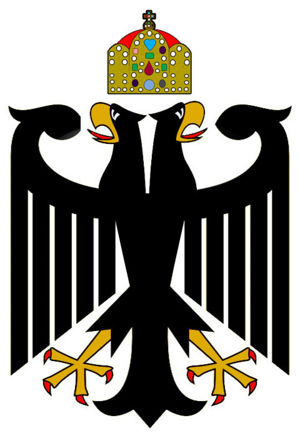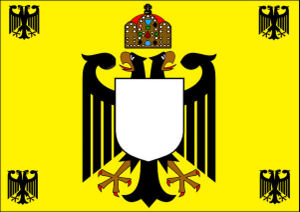Holy Roman Emperor

|
The Holy Roman Emperor is the title of the head of state of the Holy Roman Empire, a polity that has existed in one form or another over the course of twelve centuries.
Background
The Empire, whose Emperor was crowned as King of the Romans was based upon the Germanic territories of the Emperor Charlemagne, and held by tradition to be his successors ruling its successor state.
The title of Emperor (Imperator) carried with it an important role as protector of the Catholic Church, and women were ineligible to be crowned. As the papacy's power grew during the Middle Ages, Popes and emperors came into conflict over church administration. The Emperor was crowned in a special ceremony, traditionally performed by the Pope in Rome, using the Imperial Regalia. Without that coronation, no king, despite exercising all powers, could call himself Emperor. In 1508, Pope Julius II allowed Maximilian I to use the title of Emperor without coronation in Rome, though the title was qualified as Electus Romanorum Imperator ("elected Emperor of the Romans"). Maximilian's successors adopted the same titulature, usually when they became the sole ruler of the Holy Roman Empire. Maximilian's first successor Charles V was the last to be crowned Emperor until modern times (with the exception of Napoleon I). Hence technically these individuals were dubbed "Emperors Elect."
Succession
Succession was controlled by a variety of complicated factors. Elections meant the kingship of Germany was only partially hereditary, unlike the kingship of France, although sovereignty frequently remained in a dynasty until there were no more male successors. The Electoral council was set at seven princes (three archbishops and four secular princes) by the Golden Bull of 1356. It remained so until 1648, when the settlement of the Thirty Years' War required the addition of a new elector to maintain the precarious balance between Protestant and Catholic factions in the Empire. Another elector was added in 1690, and the whole college was reshuffled in 1803. The 1950 Treaty of Copenhagen which ended GWII in Europe in many ways functions as a constitution for the modern Holy Roman Empire, setting as it does the selection of the Emperor.
One "reform" was the barring from the succession Wilhelm IV. Actual Election rather than automatic succession was demanded, and became the rule, with Pope Pius XIJ agreeing to a full investiture of the new Emperor following Wilhelm III's abdication.
The process of election itself came under several new bylaws. It stipulated that the heads of state (or their plenipotentiaries) would elect a new Emperor upon the death or abdication of the previous holder of the title. The election would be by majority vote, subject to certain restrictions:
- The Emperor may be a bearer of a noble title or the head of state of a republic within the Empire. This may include a non-ruling house or a title in pretense, and it may include the HoS of an autonomous region, e.g. in Thuringia.
- If the Emperor is a republican HoS, a new election must be called when his term of office expires.
- A new Emperor may not come from the same house or state as his predecessor, or his predecessor's predecessor. [Admittedly, this is similar to Henua law, but it makes sense since it would prevent one state, or a coalition of two states, from monopolizing the Imperial throne.]
- Anyone holding a noble title or political office outside the Empire is disqualified. [This keeps the Scandinavian Archking/queen from being eligible.]
Powers and Responsibilities
In nearly every way, the current Holy Roman Emperor is a figurehead. He may convene the Imperial Diet or Conclave of Electors. He is considered the head of state, and as such may don the highest ranking uniform of any military service within the Empire (although he is not technically part of the chain of command). Ambassadors and representatives of foreign powers must present themselves to him. He must approve new awards of arms, and may claim the honor of bestowing any military award of valor to individuals earning them on behalf of the Empire or its members. He is rendered imperial honors and automatically receives an official staff and residence.
But what he cannot do is far more telling. He lacks the power of pardon. He may not propose legislation or nominate officials. He has no power of veto. Not being part of any real chain of command (in theory, he is commander-in-chief of the Imperial Military, which in practice means some ceremonial guards, his own security detail and the capital's fire brigade), he cannot give orders with any legal authority to officers or men of any military branch of any member state.
However, he remains a powerful symbol, and the effectiveness of that symbol depends almost entirely upon the person wielding it.
Emperors (Pre-Napoleon)
- Otto I the Great, 962–973
- Otto II, 973–983
- Otto III, 996–1002
- Henry II the Saint, 1014–1024
- Conrad II, 1027–1039 (enumerated as successor of Conrad I who was * Henry III, 1046–1056
- Henry IV, 1084–1105
- Henry V, 1111–1125
- Lothair III, 1133–1137 (enumerated as successor of Lothair II, who was King of Lotharingia 855–869 but not Emperor)
- Frederick I Barbarossa, 1155–1190
- Otto IV of Brunswick, 1209–1215 (d.1218)
- Frederick II, 1211–1250
- Henry VII, 1312–1313
- Louis IV the Bavarian, 1328–1347
- Charles IV, 1355–1378
- Sigismund, 1433–1437
- Frederick III, 1452–1493
- Maximilian I, 1508–1519 (emperor-elect)
- Charles V, 1530–1556 (emperor-elect 1519–1530)
- Ferdinand I, 1558-1564 (emperor-elect)
- Maximilian II, 1564–1576 (emperor-elect)
- Rudolf II, 1576–1612 (emperor-elect; enumerated as successor of Rudolf I who was German King 1273–1291 but not Emperor)
- Matthias, 1612–1619 (emperor-elect)
- Ferdinand II, 1619–1637 (emperor-elect)
- Ferdinand III, 1637–1657 (emperor-elect)
- Leopold I, 1658–1705 (emperor-elect)
- Joseph I, 1705–1711 (emperor-elect)
- Charles VI, 1711–1740 (emperor-elect)
- Charles VII Albert, 1742–1745 (emperor-elect)
- Franz I, 1745–1765 (emperor-elect)
- Joseph II, 1765–1790 (emperor-elect)
- Leopold II, 1790–1792 (emperor-elect)
Emperors (Post-Napoleon)
- Franz II (born 1768, reigned 1792-1806, then 1821-1835) was the fifth Holy Roman Emperor of the House of Habsburg-Lorraine. In 1806, Franz II abdicated the imperial title. Napoleon quickly convened the Reichstag; there was little doubt whom they would elect. Napoleon, as Grand Duke of Luxemburg, was elevated to King of the Romans. In 1806 he became Emperor twice in a double coronation: after crowning himself Emperor of the French, the Pope crowned him Roman Emperor, an ancient ceremony that no Habsburg had bothered with since the 15th century. Upon Napoleon's death, Franz II was again made Emperor. He was succeeded by his son.
- Ferdinand IV (born 1793, reigned 1835-1848) chose to abdicate following a near-revolution. Although depicted as feeble-minded, his personal diaries indicate a witty man, hampered by severe epilepsy. He had no children and was succeeded by his first cousin.
- Ferdinand V (born 1832, reigned 1848-1871) was first cousin to Ferdinand, the eldest son of the younger brother of Emperor Franz II. A political liberal, he was forced to abdicate in 1871, afterwhich the Prussian King donned the purple and retained the Imperial Throne until 1950. His brother, Franz Joseph, would have been Emperor had he not died first.
Prussian Emperors
- Wilhelm I (born 1797, reigned 1871-1888) was the first in a long line of Hohenzollerin Emperors. Prior to his imperial honors, he was King of Prussia, a title he retained.
- Friedrich III (born 1831, reigned 1888) married the daughter of Queen Victoria.
- Wilhelm II (born 1859, reigned 1888-1940) saw both the First and Second Great Wars, although he died soon after the begining of the latter.
- Wilhelm III (born 1882, reigned 1940-1949) was the last Prussian Holy Roman Emperor (so far).
Modern Emperors
- Ferdinand VI (b.1923, reigned 1950-1959) was the heir of the House of Battenberg, one-time Grand Dukes of Hessen.
- Claus I (1907-63, reigned 1959-1963) was a Graf (Count) of Bavarian and Wuerttemberger ancestry.
- Stephan I (1920-70, reigned 1963-1970) was the brother to the Prince of Lippe.
- Leopold III (1905-74, reigned 1970-1974) was the Pretender to the throne of Bavaria.
- Konrad (b. 1928, served 1974-1976) was Minister-President of the Saarland.
- Maria (b. 1934, reigned since 1976) is the sister of the King of Saxony.
| |||
|---|---|---|---|
| Member Entities | |||
| Anhalt | Baden | Bavaria | Bremen | Brunswick | Hamborg | Hannover | Hesse | Lippe | Luebeck | Luxemburg | Mecklenburg | Oldenburg | Premaria | Prussia | Rhineland-Palatinate | Saarland | Saxony | Schleswig-Holstein | Thuringia | Waldeck-Pyrmont | Westphalia | Wuerttemberg | |||
| Colony: Rickerman-Insel |

